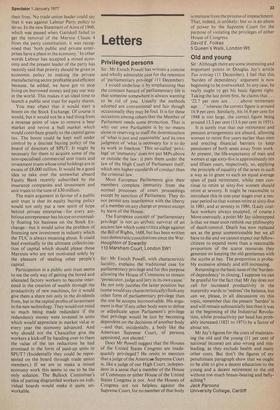Privileged persons Sir: Mr Enoch Powell has written a concise
and wholly admirable case for the retention of 'parliamentary privilege' (II December).
I would underline it by emphasising that the constant hazard of parliamentary life is that someone somewhere is always wanting to be rid of you. Usually the methods adopted are conventional and fair though occasionally they may be foul. It is for these occasions among others that the Member of Parliament needs some protection. That is why our own Parliament is by no means alone in reserving to itself the determination of 'what is just and reasonable' and its own judgment of 'what is necessary for it to do its work in freedom.' This so-called 'privilege' or 'immunity' does not put M Ps above or outside the law: it puts them under the law of the High Court of Parliament itself, which sets higher standards of conduct than the criminal law.
Most European Parliaments give their members complete immunity from the normal processes of court proceedings except by sanction of Parliament. They do not permit any interference with the liberty of a member on any charge or pretext except by leave of the House.
The European concept of 'parliamentary privilege' is not an archaic survival of an ancient law which some critics allege against the Bill of Rights, 1688, but has been written into democratic constitutions since the War. Houghton of Sowerby 110 Marsham Court, London SW1
Sir: Mr Enoch Powell, with characteristic lucidity, explains the traditional case for parliamentary privilege and for this purpose allowing the House of Commons to remain 'prosecutor, judge and jury in its own cause.' He not only justifies the latter position but (some would say characteristically) finds any other form of parliamentary privilege than the one he accepts inconceivable. His argument is that 'if any other body were to define or adjudicate upon Parliament's privilege that privilege would be lost by becoming dependent on the decisions of another body —and that, incidentally, a body like the American Supreme Court, of persons appointed, not elected.'
Does Mr Powell suggest that the Houses of the United States Congress are inadequately privileged? He omits to mention that a judge of the Americac Supreme Court is, like a judge of our High Court, independent in a sense that a member of the House of Commons or either House of the United States Congress is not, And the Houses of Congress are not helpless against the Supreme Court, for no member of that body
is immune from the process of impeachment. That, indeed, is unlikely; but so is an abuse of power by the Supreme Court for the purpose of violating the privileges of either House of Congress.
David E. Flakes 5 Queen's Walk, London W5






















































 Previous page
Previous page